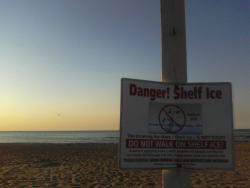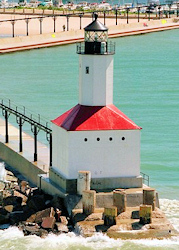  |
 Jun 16 2011, 10:39 AM Jun 16 2011, 10:39 AM
Post
#1
|
|
 Spends WAY too much time at CBTL       Group: Admin Posts: 16,425 Joined: 8-December 06 From: Michigan City, IN Member No.: 2 |
http://online.wsj.com/article/SB1000142405...8.html?mod=e2fb
QUOTE Today's Pirates Have Their Own Stock Exchange Western powers patrol the seas but do little to stop pirate financing. By AVI JORISCH Pirates are on a hot streak this season. World-wide, the first quarter of 2011 saw 142 recorded attacks, up from 67 in that time last year. Off the coast of Somalia there were 97, as against 35 last year. Why? Despite some efforts by Western powers to patrol the Horn of Africa, pirates are still able to access capital, as any successful business must. The world's first pirate stock exchange was established in 2009 in Harardheere, some 250 miles northeast of Mogadishu, Somalia. Open 24 hours a day, the exchange allows investors to profit from ransoms collected on the high seas, which can approach $10 million for successful attacks against Western commercial vessels. While there are no credible statistics available, reports from various news sources suggest that over 70 entities are listed on the Harardheere exchange. When a pirate operation is successful, it pays investors a share of the profits. According to a former pirate who spoke to Reuters, "The shares are open to all and everybody can take part, whether personally at sea or on land by providing cash, weapons or useful materials. . . . We've made piracy a community activity." The big player on the Harardheere exchange is a pirate named Mohammed Hassan Abdi, who goes by the name of "Afweyne," or "Big Mouth." Known as the "father of piracy," Abdi and his son Abdiqaadir are in charge of the exchange and are, according to a recent United Nations report, among the best-known pirates in the area. Abdi's boats have hijacked a variety of ships, including the German freighter Hansa Stavanger, which German special forces tried unsuccessfully to liberate in 2009. After a four-month hostage ordeal, the pirates released the ship off the coast of Kenya. Piracy has changed Harardheere from a small fishing village to a town crowded with luxury cars. As local security officer Mohamed Adam put it to Reuters, "Piracy-related business has become the main profitable economic activity in our area and as locals we depend on their output." Mr. Adam claims that the district government gets a cut of every dollar collected by pirates and uses it—naturally—for schools, hospitals and other public infrastructure. Cutting off these financial relationships is essential to curbing piracy. The U.S. could begin by instituting, via executive order, a sanctions regime against these rogue actors. Just as the government maintains lists of terrorists, narco-traffickers, weapons proliferators and money launderers, so too should it keep a list of pirates. This would heighten international awareness of piracy and give banks an additional tool to employ against illicit actors. Pirates, like all other criminals, eventually use the banking sector to try to hide their criminal gains. The U.N. and other international organizations—such as the Financial Action Task Force (FATF), an intergovernmental body that sets standards regarding terrorism finance and money laundering—also have roles to play. For one, the U.N. should expand its current Somalia and Eritrea monitoring committee, which was established in 1992 to implement the U.N. travel ban, asset freeze, and arms embargo on Somalia, as well as the arms embargo on Eritrea. An expanded committee could improve the anti-piracy intelligence-gathering capabilities of its members and track the finances of significant international pirates. For its part, the FATF could get serious about including piracy within its mission of highlighting how money launderers and terrorists raise and move funds. To date, the organization has never issued a report on piracy. Doing so would prod a variety of international organizations, policy makers, law-enforcement agencies, and banking authorities to grapple seriously with this threat. There are four banks in Somalia today—the Central Bank, the Commercial and Savings Bank of Somalia, and the Somali Development Bank (all of which are wholly or partly owned by the government), as well as the independent Universal Bank of Somalia. International financial institutions providing correspondent banking services to the four, or wiring money into or out of the country, should carry out enhanced due diligence on all transactions to make sure they are not related to piracy or the Harardheere stock exchange. In Washington, the Treasury Department could mandate this standard of care by issuing guidance to all American financial institutions. Piracy increases the cost of international commerce by $12 billion annually, and in Somalia alone more than 20 vessels and 400 hostages are currently being held, according to the International Chamber of Commerce. The U.S. and others have a duty to deploy their financial firepower against this threat. Mr. Jorisch, a former U.S. Treasury official, is president of the Red Cell Intelligence Group and the author of "Tainted Money: Are We Losing the War on Money Laundering and Terrorism Finance?" (Red Cell IG, 2009). |
 Jun 19 2011, 03:47 AM Jun 19 2011, 03:47 AM
Post
#2
|
|
 Really Comfortable      Group: Members Posts: 1,177 Joined: 19-November 09 Member No.: 969 |
 Somali Pirates in Discussions to Acquire Citigroup By Andreas Hippin November 20 (Bloomberg) -- The Somali pirates, renegade Somalis known for hijacking ships for ransom in the Gulf of Aden, are negotiating a purchase of Citigroup. The pirates would buy Citigroup with new debt and their existing cash stockpiles, earned most recently from hijacking numerous ships, including most recently a $200 million Saudi Arabian oil tanker. The Somali pirates are offering up to $0.10 per share for Citigroup, pirate spokesman Sugule Ali said earlier today. The negotiations have entered the final stage, Ali said. "You may not like our price, but we are not in the business of paying for things. Be happy we are in the mood to offer the shareholders anything," said Ali. The pirates will finance part of the purchase by selling new Pirate Ransom Backed Securities. The PRBS's are backed by the cash flows from future ransom payments from hijackings in the Gulf of Aden. Moody's and S&P have already issued their top investment grade ratings for the PRBS's. Head pirate, Ubu Kalid Shandu, said: "We need a bank so that we have a place to keep all of our ransom money. Thankfully, the dislocations in the capital markets has allowed us to purchase Citigroup at an attractive valuation and to take advantage of TARP capital to grow the business even faster." Shandu added, "We don't call ourselves pirates. We are coastguards and this will just allow us to guard our coasts better." In real pirate news, the Weekly Piracy Report counted 11 incidents last week. And James Carrol debunks the lessons of piracy in the International Herald Tribune. |
 Jul 6 2011, 10:47 PM Jul 6 2011, 10:47 PM
Post
#3
|
|
|
Advanced Member     Group: Members Posts: 253 Joined: 25-December 07 Member No.: 756 |
Don't you know the name of their group?
African Attacking Revenue Generating Holdings...or AARGH for short. Pirates...AARGH...I kill me sometimes...  "If a man opens the car door for his wife, it's either a new car or a new wife." - Duke of Edinburgh.
|
  |
1 User(s) are reading this topic (1 Guests and 0 Anonymous Users)
0 Members:
| Lo-Fi Version | Time is now: 27th April 2024 - 10:04 AM |
Skin Designed By: neo at www.neonetweb.com
Invision Power Board
v2.1.7 © 2024 IPS, Inc.








